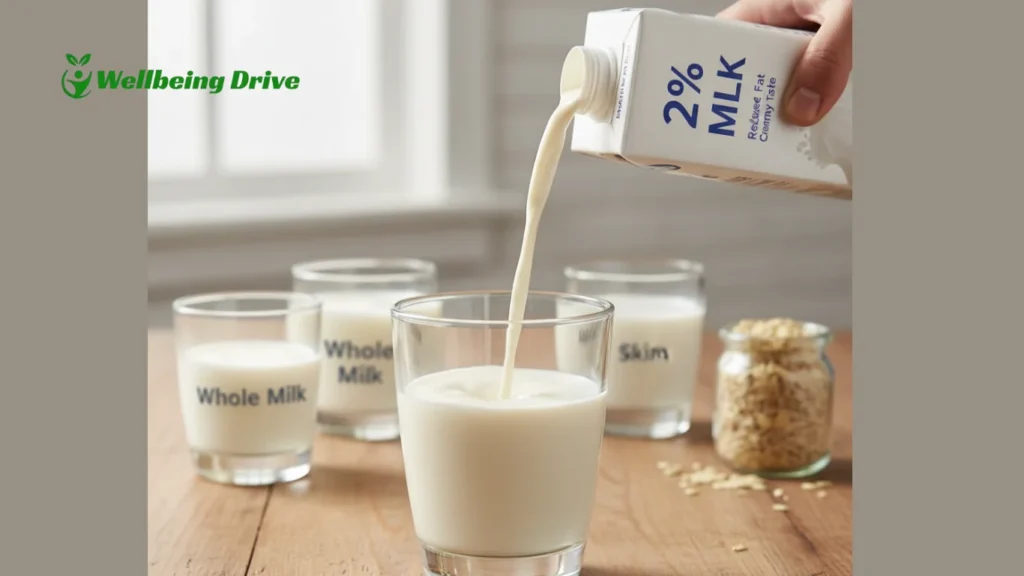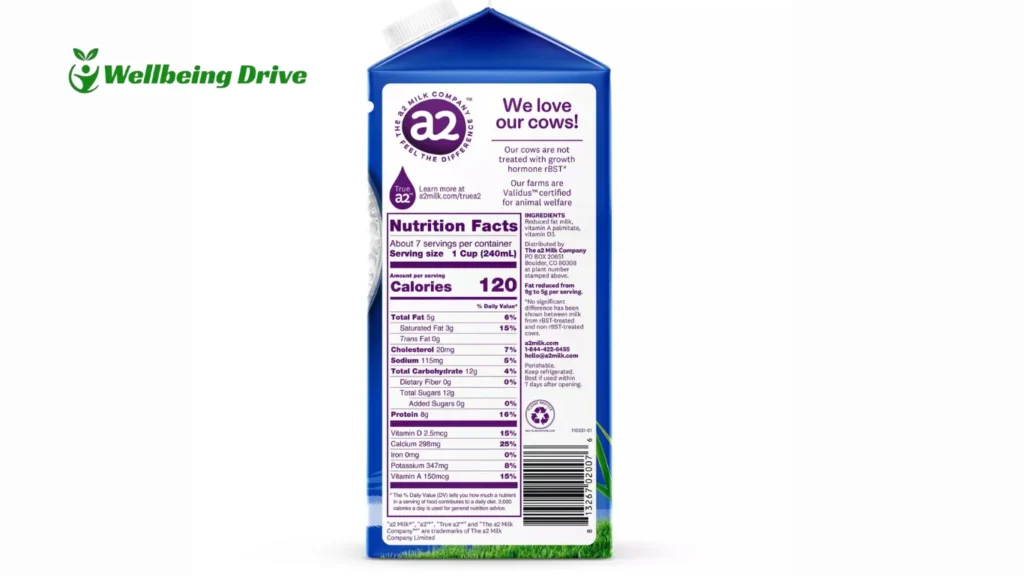Milk is one of the most widely consumed beverages in the world, and understanding its nutrient profile is essential for a healthy diet. In this article, we will explore 2 Percent Milk Nutrition Facts, including its calories, vitamins, minerals, health benefits, and serving sizes. Milk provides essential nutrients like protein, calcium, vitamins, and minerals, which support overall health and wellness.
Among the various types of milk available, 2 percent milk, also known as reduced-fat milk, is a popular choice for people seeking a balance between creamy taste and lower fat content. Unlike whole milk, it offers fewer calories from fat while retaining much of the milk’s natural flavor and nutritional benefits. This makes it suitable for a wide range of individuals, from children and adults to athletes and those managing their weight.
What is 2 Percent Milk?

2 percent milk is called so because it contains 2% fat by weight, offering a middle ground between whole milk (3.25% fat) and skim milk (less than 0.5% fat). It retains a creamy texture while lowering saturated fat content, making it ideal for many people aiming for a healthier lifestyle without sacrificing taste.
2 Percent Milk Nutrition Facts Table

Here’s a detailed breakdown of nutrition facts in 2 percent milk per 1 cup (8 oz / 240 mL) serving:
| Nutrient | Amount per Serving | % Daily Value |
|---|---|---|
| Calories | 113–130 kcal | 6% |
| Total Fat | 4.5–5 g | 6% |
| Saturated Fat | 2.9–3.5 g | 15% |
| Trans Fat | 0–0.1 g | — |
| Cholesterol | 18–20 mg | 6–7% |
| Sodium | 93–130 mg | 4–6% |
| Total Carbohydrate | 10.6–12 g | 4–8% |
| Dietary Fiber | 0 g | 0% |
| Sugars | 10.6–12 g | — |
| Protein | 7.5–8 g | 13–16% |
| Calcium | 265–300 mg | 20–25% |
| Potassium | 340–400 mg | 9–10% |
| Vitamin A | 125–150 mcg | 14–15% |
| Vitamin D | 2.5 mcg | 10% |
| Iron | 0–0.1 mg | 0% |
Percent Daily Values (DV) are based on a 2,000 calorie diet.
References: USDA FoodData Central, MyFoodData
Calories in 2 Percent Milk
Understanding 2 percent milk calories is important for dietary planning:
- 1 cup (8 oz): ~113–130 calories
- 1/2 cup (4 oz): ~56–65 calories
- 2 cups (16 oz): ~226–260 calories
Calories come from protein, fat, and naturally occurring sugars (lactose). Knowing how many calories in 8 oz of 2 milk helps track energy intake.
Macronutrients in 2 Percent Milk
1. Protein
2 percent milk contains 7.5–8 g of protein per cup, providing all essential amino acids. Both casein (80% of protein) and whey (20%) are high-quality proteins that support muscle growth, repair, and overall health.
2. Fat
- Total fat: 4.5–5 g
- Saturated fat: 2.9–3.5 g
- Trans fat: 0–0.1 g
Compared to whole milk, 2 percent milk offers reduced fat but maintains creaminess. This helps manage saturated fat intake without compromising taste.
3. Carbohydrates
Carbs in 2 milk mainly come from lactose, a natural sugar. Per cup, there are 10.6–12 g of carbs. Lactose intolerance is a common consideration, and lactose-free 2% milk can be a suitable alternative.
Vitamins and Minerals
2 percent milk is a nutrient powerhouse, containing:
- Calcium (265–300 mg): Supports bones and teeth
- Potassium (340–400 mg): Regulates blood pressure
- Vitamin D (2.5 mcg): Improves calcium absorption
- Vitamin A (125–150 mcg): Essential for vision and immunity
- Iron (0–0.1 mg): Minimal, but contributes to overall intake
References: Healthline, WebMD
Ingredients of 2 Percent Milk
Typical 2 milk ingredients include:
- Reduced-fat milk
- Nonfat milk solids
- Vitamin A palmitate
- Vitamin D3
Allergens: Contains milk
Knowing what’s in 2 milk helps those with allergies or dietary restrictions make safe choices.
Health Benefits of 2 Percent Milk
1. Bone Health
Calcium, protein, and vitamin D in 2 percent milk strengthen bones and may reduce the risk of osteoporosis.
2. Muscle Growth and Repair
High-quality protein promotes muscle maintenance and recovery, ideal for active individuals.
3. Heart Health
Potassium and moderate fat content can contribute to healthy blood pressure and cardiovascular function, especially when consumed in moderation.
4. Weight Management
2 percent milk provides nutrients without excessive calories, making it suitable for balanced diets.
References: Harvard School of Public Health, Gundersen Health System
Possible Downsides
- Lactose Intolerance: Can cause bloating, gas, and digestive discomfort.
- Milk Allergy: Rare in adults but may cause skin reactions or gastrointestinal issues.
- Acne and Hormones: Some studies link dairy consumption to acne in sensitive individuals.
Serving Sizes and Practical Tips
- 1 cup (8 oz): Perfect for cereal, coffee, or smoothies
- 1/2 cup (4 oz): Suitable for recipes or small snacks
- 2 cups (16 oz): Ideal for higher protein needs or athletes
Incorporating 2 percent milk into balanced meals ensures adequate nutrient intake.
Conclusion
2 Percent Milk offers a balance of creaminess, nutrients, and moderate fat content. It is rich in protein, calcium, vitamins, and minerals, supporting bone health, muscle maintenance, and overall wellness. Understanding milk 2 percent nutrition facts, calories, and serving sizes allows for smarter dietary choices. Individuals with lactose intolerance or allergies should opt for alternatives.
FAQs about 2 Percent Milk Nutrition Facts
Q1: How many calories are in 1 cup of 2 percent milk?
One cup (8 oz) of 2 percent milk contains approximately 113–130 calories, depending on the brand. It provides energy mainly from protein, fat, and natural sugars. This makes it a moderate-calorie choice for most diets.
Q2: What nutrients are in 2 percent milk?
2 percent milk is rich in protein, calcium, potassium, vitamin D, and vitamin A. It also contains moderate fat and carbohydrates. These nutrients support bone health, muscle growth, and overall wellness.
Q3: Can I drink 2 percent milk if I’m lactose intolerant?
People with lactose intolerance may experience discomfort from regular 2 percent milk. Lactose-free 2 percent milk offers the same nutrients without lactose. It’s a good alternative to enjoy milk safely.
Q4: How does 2 percent milk compare to whole milk?
2 percent milk has lower fat and fewer calories than whole milk but retains a creamy texture. It still provides essential nutrients like calcium and protein. This makes it a healthier choice for those watching fat intake.
Q5: How much 2 percent milk should I drink daily?
A typical serving is 1 cup (8 oz) per meal or as needed to meet calcium and protein needs. Adults usually benefit from 2–3 servings per day. Balance it with other calcium-rich foods for a healthy diet.
Disclaimer: The content on Wellbeingdrive is for informational purposes only and not a substitute for professional advice. Always consult a qualified expert for health concerns.

